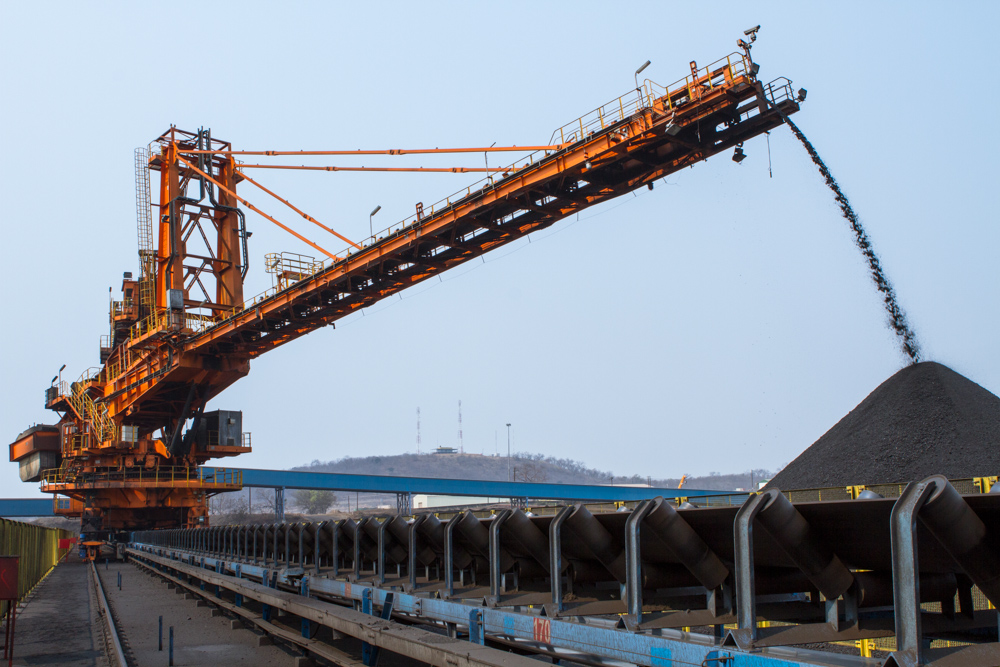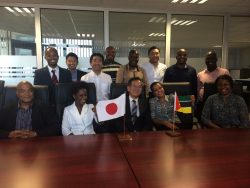Mitsui to participate in Large Scale Project in Mozambique
23.02.2015
INTERVIEW

Mitsui & Co., Ltd. has agreed with Vale S.A. to participate in the Moatize coal mine project
(“Moatize project”) and the Nacala Corridor rail & port infrastructure project (“Nacala project”), which Vale has been operating and developing in Mozambique.
Mitsui will own a 15% equity interest in Vale’s wholly-owned investment subsidiary that holds a 95% equity interest in the Moatize project, and own a 50% equity interest in Vale’s investment subsidiaries that have been promoting the Nacala project. Mitsui’s upfront payment amount for investment and loans is USD 450 million for the mine and USD 313 million for the infrastructure. Mr. Takashi Tomita, Mitsui & Co., replied to our questions. (see the news release of Mitsui & Co.)
Q1. When did you start the “Nacala project”?
 We have been negotiating with Vale concerning our participation in the Moatize project since the beginning of the project in 2004. The negotiation got accelerated in November 2013 when Vale announced the possibility of selling a part of their shares in both coal mine and infrastructure projects. Finally, the visit of Prime Minister Shinzo Abe to Mozambique gave a boost to the mutual agreement.
We have been negotiating with Vale concerning our participation in the Moatize project since the beginning of the project in 2004. The negotiation got accelerated in November 2013 when Vale announced the possibility of selling a part of their shares in both coal mine and infrastructure projects. Finally, the visit of Prime Minister Shinzo Abe to Mozambique gave a boost to the mutual agreement.
Q2. Could you explain your business model?
Moatize mine is one of the largest and cost-competitive operating coal mines in the world and Nacala Corridor rail & port infrastructure is generating stable income not only from the transport of coal but also from logistics of a wide range of cargo and passengers.
Q3. What are the attractive points of Mozambique for the Japanese?
 Japan and Mozambique have a long historical relationship. It is said that there was a Mozambican worked for Nobunaga Oda, a famous warlord of Japan in the 16th century, as the possible first African in Japan. The Tensho Delegation, the first official mission of Japan to Europe, stayed in Mozambique on the way back home. The exchanges of diplomats between Japan and U. S. A. or U. K. were realized in Mozambique after the outbreak of World War II. Peacekeeping Operations which started from 1993 and development assistance programs by the Japanese government, contributed to the recovery of Mozambique from internal war.
Japan and Mozambique have a long historical relationship. It is said that there was a Mozambican worked for Nobunaga Oda, a famous warlord of Japan in the 16th century, as the possible first African in Japan. The Tensho Delegation, the first official mission of Japan to Europe, stayed in Mozambique on the way back home. The exchanges of diplomats between Japan and U. S. A. or U. K. were realized in Mozambique after the outbreak of World War II. Peacekeeping Operations which started from 1993 and development assistance programs by the Japanese government, contributed to the recovery of Mozambique from internal war.
 We think the Japanese and Mozambicans are in common in terms of personality in general, and share sympathy for each other. Both countries have the right-hand-driving system and many second hand cars and buses imported from Japan with Japanese characters on their body are found in Mozambique. The Japanese also use words that originally came from Portuguese, which is the official language in Mozambique, and finally you can also enjoy variety of nice seafood in Mozambique that the Japanese love very much.
We think the Japanese and Mozambicans are in common in terms of personality in general, and share sympathy for each other. Both countries have the right-hand-driving system and many second hand cars and buses imported from Japan with Japanese characters on their body are found in Mozambique. The Japanese also use words that originally came from Portuguese, which is the official language in Mozambique, and finally you can also enjoy variety of nice seafood in Mozambique that the Japanese love very much.
According to the ranking of Doing Business published by the World Bank, Mozambique was 127th out of 189 countries in 2015, improving from 142nd in the previous year. We believe it will encourage Japanese companies that are searching for business opportunities and accelerate investment in Mozambique.
Q4. What is the strategic importance of Mozambique for Japanese business enterprises?
 Mozambique is geographically located at an important location for Japan. Considering that Japan relies on import of natural resources, it is important to diversify its supply source to obtain stable supply in terms of energy security. From this point of view, it is significant for Japan to have Mozambique LNG project as a supply source of LNG from East Africa, and to have a supply source from a project that a Japanese company participates.
Mozambique is geographically located at an important location for Japan. Considering that Japan relies on import of natural resources, it is important to diversify its supply source to obtain stable supply in terms of energy security. From this point of view, it is significant for Japan to have Mozambique LNG project as a supply source of LNG from East Africa, and to have a supply source from a project that a Japanese company participates.
Mozambique is rich in resources but improvements could be made in the infrastructures such as water, electricity, roads, railways and ports and there are many opportunities where Japanese companies can contribute. The Mozambican economy is showing annual growth of more than 7% and is expected to increase to around 8%. Japan and Mozambique can work together and grow together by improving the infrastructures that could also make Mozambique as a hub of the region and bring new opportunities.
Q5. You have established the Japan-Mozambique Friendship Association, what kind of activities are you planning?
The importance of initiatives of the private sector for economic growth was emphasized in the 5th Tokyo International Conference on African Development (TICAD V) in June 2013 and a bilateral investment treaty was signed between Japan and Mozambique as the first sub-Sahara country.
Prime Minister Abe visited Mozambique in January 2014 with about 30 representatives of Japanese companies and again, the importance of private sector for the growth was confirmed and an Investment Forum was organized during the visit. After this visit public and private joint business meeting was held in July 2014 for improvement of the business environment and promotion of investment.
Considering these movements, His Excellency Ambassador Extraordinary and Plenipotentiary to Japan Mr. Belmiro José Malate addressed the idea of the establishment of the friendship association and requested us to support the establishment of the association as our company is engaged in the LNG development project in the northern part of the country.
We feel that engagement between Japan and Mozambique is still limited to certain members compared with other countries. For the purpose of promoting mutual understanding and friendship to contribute to the growth and prosperity of both countries, the association was established in January 2015 memorializing the 40th anniversary of independence of Mozambique.
Q6. Which kinds of industries have opportunities in Mozambique?
President Filipe Nyusi has announced during his inauguration ceremony in January 2015 the vision to realize economic growth not only by natural resources like coal, LNG or heavy metals but also through industries that have high potentiality to create jobs such as agriculture, fisheries, transport, service and tourism. He also emphasized the importance of the improvement of transportation infrastructures, education and capacity building or health and sanitation.
It is important for Japanese companies to be a supporter of Mozambique based on a long term vision, by understanding the wide variety of needs and work together with local companies to be recognized as a reliable valued partner by providing experience, know-how and competencies for the mutual benefit.
(Photos: Mitsui & Co.)
Related Links
- Event Report: Egypt Startup Investment/Partnership Webinar “Exploring Egypt's Innovation …
- Event Report: Online Seminar on Sustainable Energy in Mozambique
- Online Seminar on Sustainable Energy in Mozambique, 22 February 2024
- Event Report: [Africa Industrialization Day 2020] Japan-Africa Business Partner Matching …
- Now available in French: UNIDO's AFRICA-JAPAN Partnership Promotion

